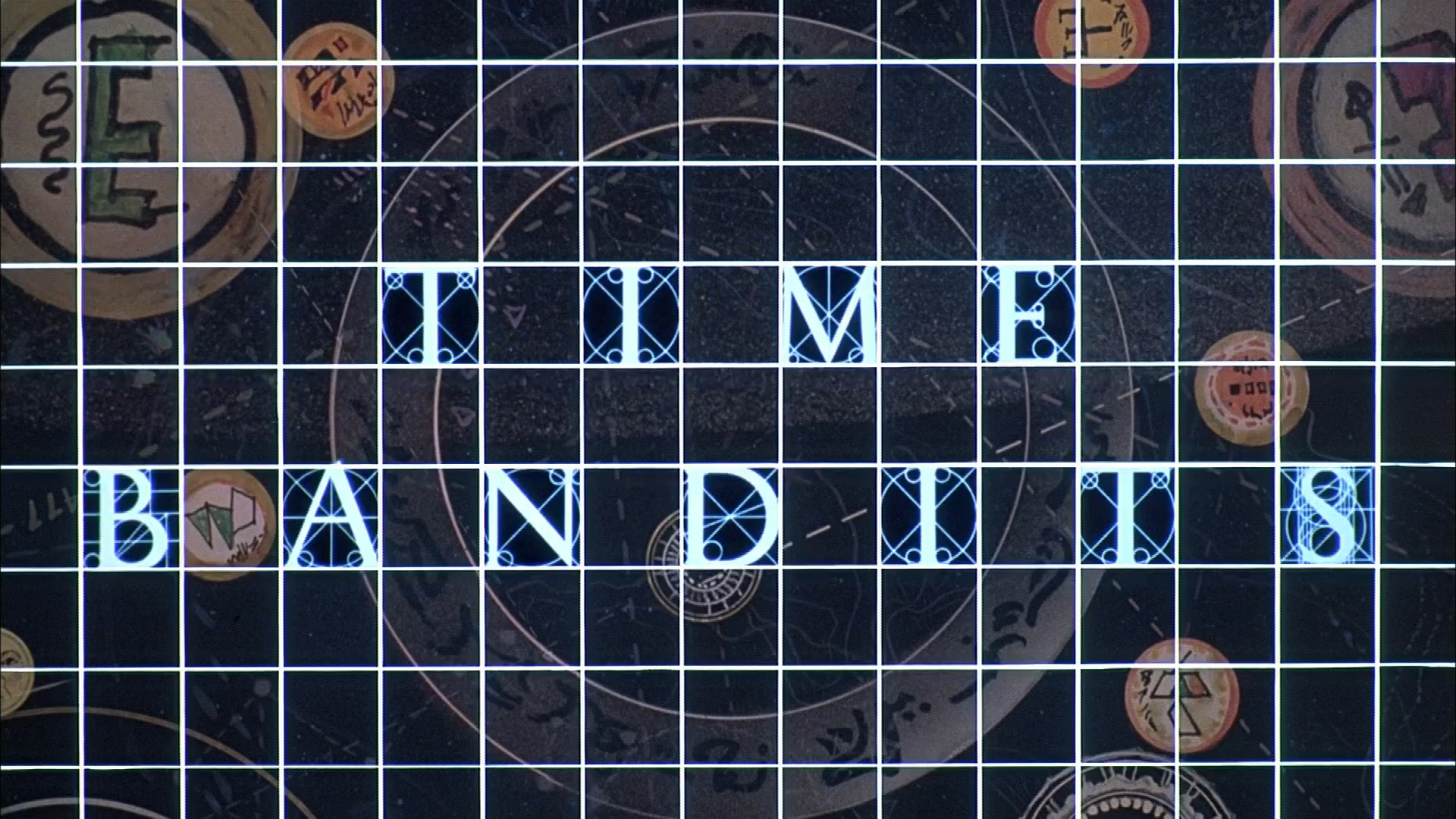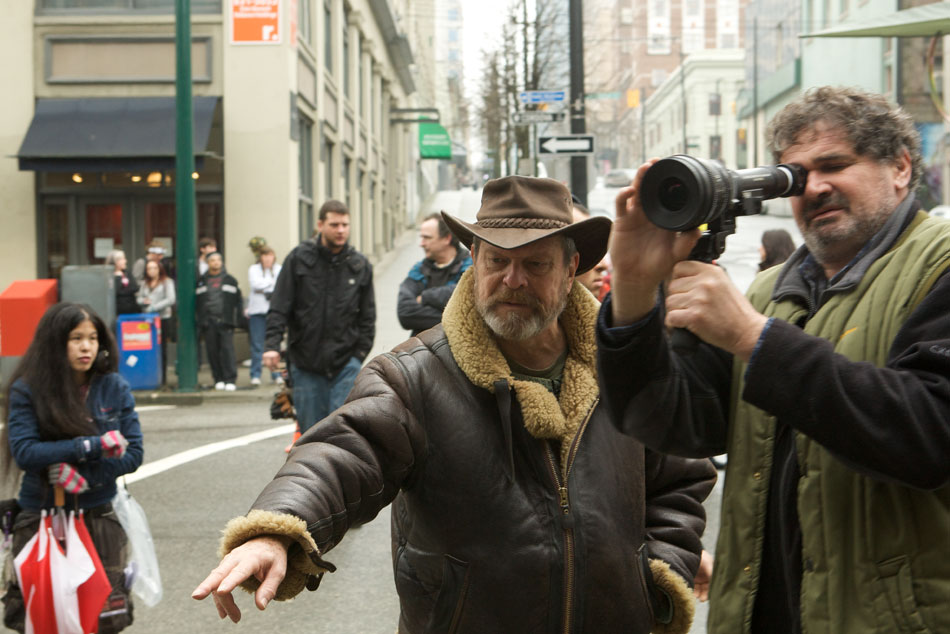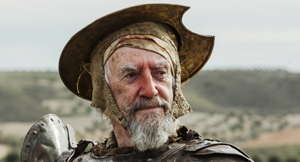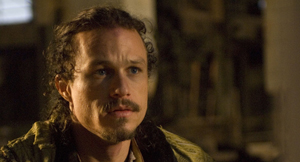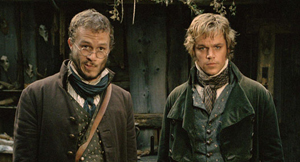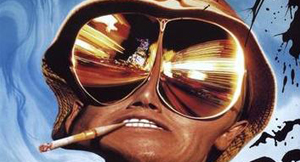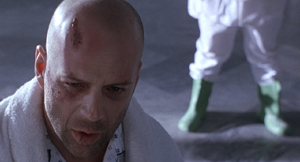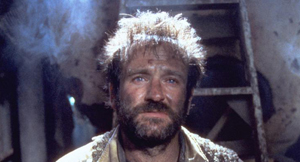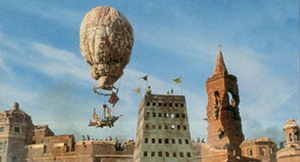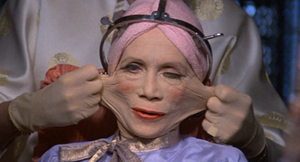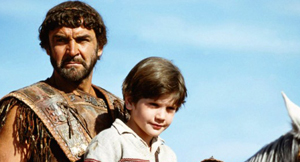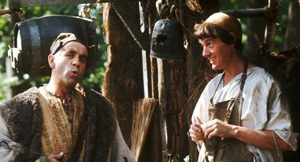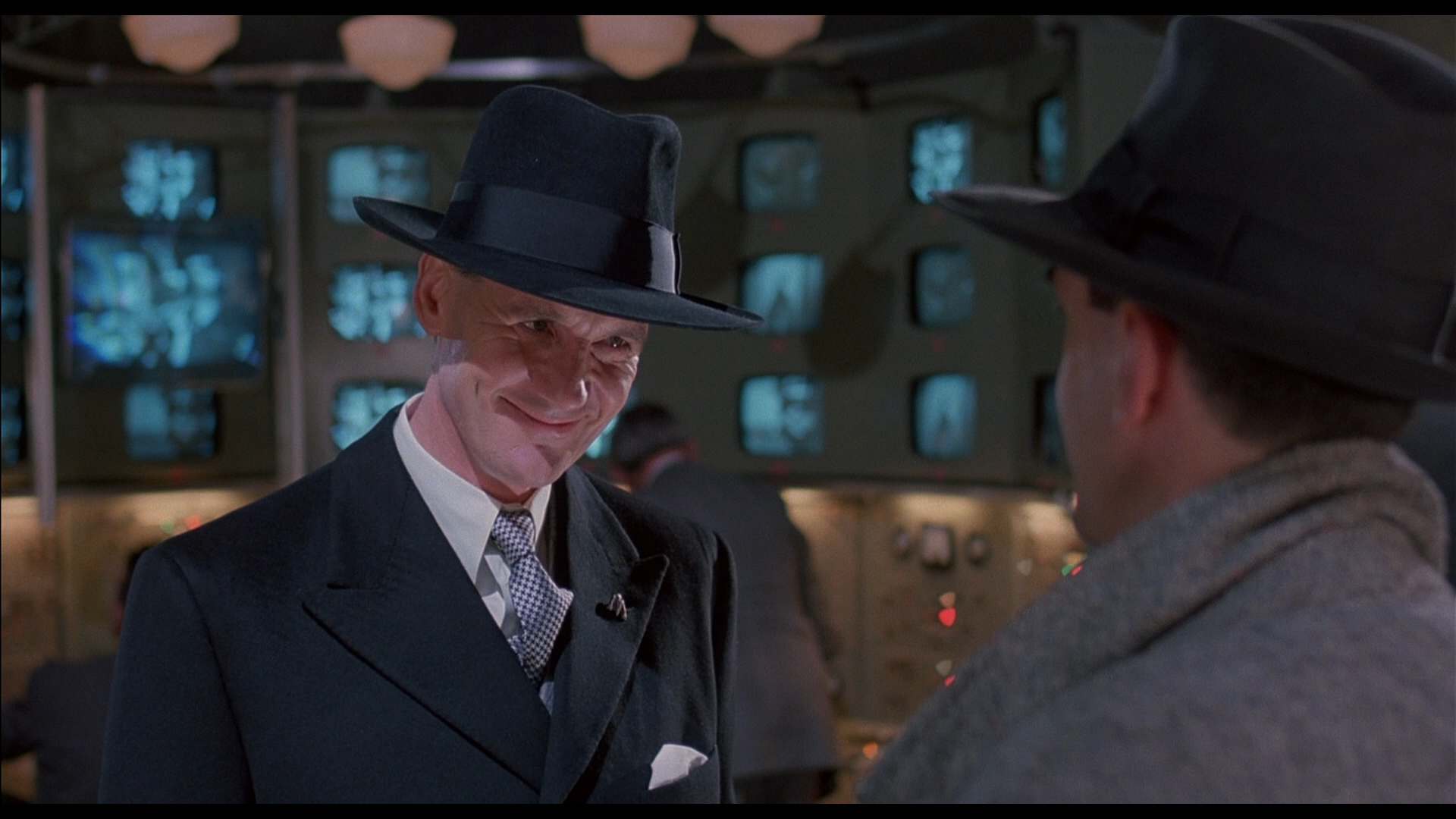
The following text is from the Press Information pack supporting Universal’s US release of Terry Gilliam’s Brazil…
Terry Gilliam: a biography by Michael Palin
Terry Gilliam, the shy diminutive genius of the British film industry, is, in fact, an Englishman inside an American body. Born and raised in Minneapolis, Los Angeles and New York, he came over to England in the mid ’60s on a very cheap flight, but, thanks to films like ”Jabberwocky” and ”Time Bandits” and his new epic ”Brazil”, he now has well over half the money for the fare back.
Despite this new affluence, Gilliam has decided to make his home in England. “It’s so much cheaper than getting builders to make it,” he jokes. On arrival in England, Gilliam was found to be insane and sent to join the Monty Python team – a unit set up by the BBC to deal with those who were too silly to find normal work. Gilliam was the animator of the group, and was occasionally given major acting roles, such as the now legendary Man In Suit of Armour With Dead Chicken. “It was either Marlon Brando or Terry Gilliam for the part,” remembers one of the Pythons, ”but everyone was using Brando.” But it was Gilliam’s cartoons with their Wittgensteinian overtones that captivated the British public and led to Terry being allowed to park his car in the BBC car park, if there was space.
But for the restless, ambitious Gilliam mere glory was not enough. “I want to be able to afford the best shampoo in the world,” he was once heard to say and it was almost inevitable that in 1976 he would become the first of the Monty Python team to make his own film. It was called ”Jabberwocky.” The film became a cult success in Gilliam’s house and after ”The Life of Brian,” in which Terry extended his acting range, he collaborated with nice, talented Michael Palin on the screenplay for ”Time Bandits”.
The film was so good and exciting that if Gilliam had been British he would probably have been offered a knighthood. As it was, he was ignored. “I directed Time Bandits!” he would shout, but bus after bus would go past. So he was forced to undergo further treatment with the Python team. The result was ”The Meaning of Life” – a marvelous film (in color).
But success in itself was no longer an attraction to the constantly, vibrantly inventive brain part of Gilliam’s head. He wanted power. A chance meeting with Arnon Milchan at a Meet Arnon Milchan evening in London led to a friendship which led to Gilliam being given the chance to make what he’s always wanted… really big explosions.
”Brazil,” as the result was eventually known, is the first film to have a country named after it. lt’s bound to arouse strong feelings. But Gilliam is no stranger to controversy – he once took a melon back to a shop – and in his characteristic way he’s ready for anything.
On the front door of his castle in London hangs a simple motto ”You don’t have to be mad to work here – but it herps.” Even spelt wrong, there’s no getting away from the wit, wonder and wizardry of the man Cahiers du Cinema once described as Terry Gilliam.
on the serious side…
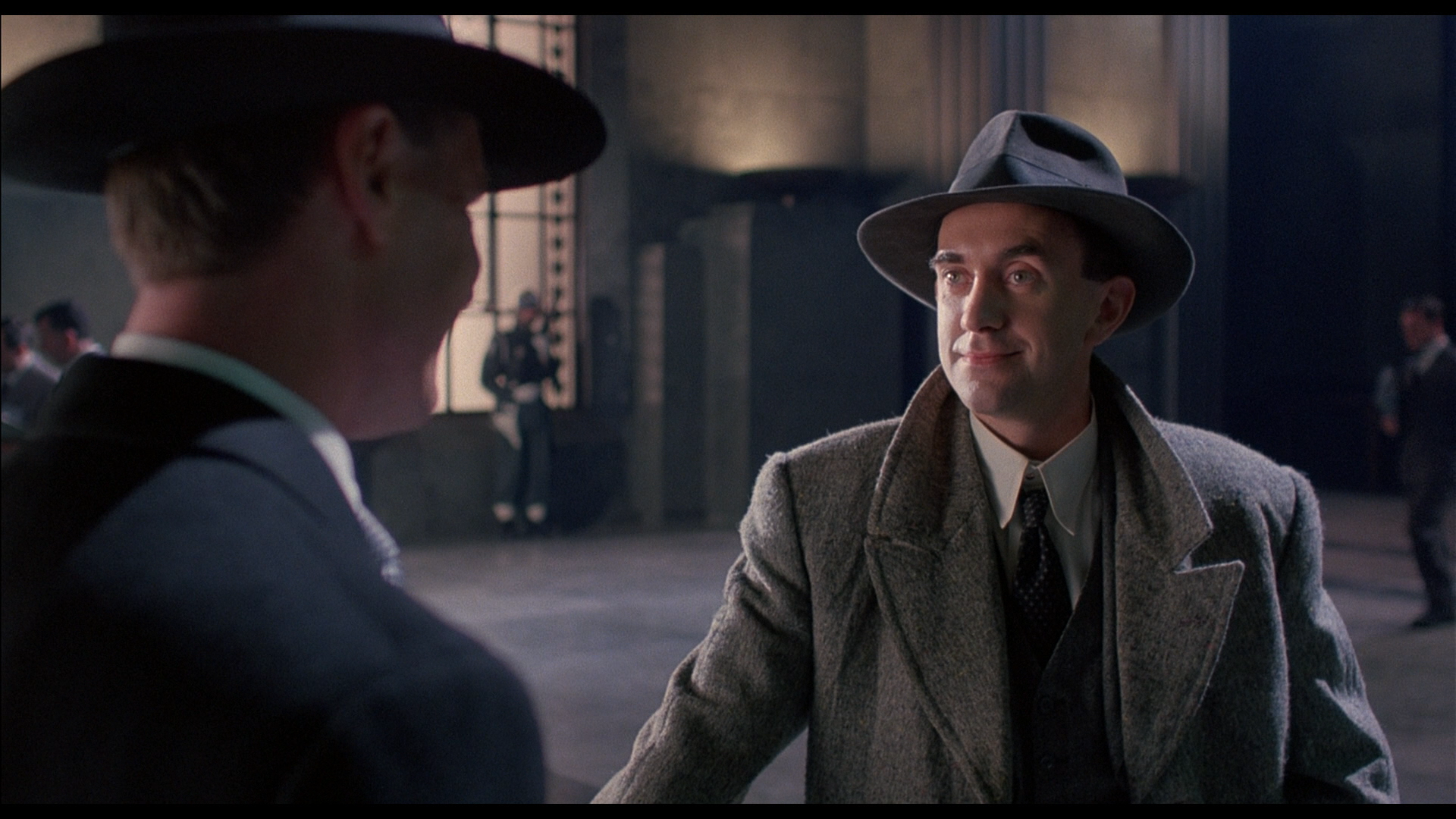
Writer and Director
Terry Gilliam was born in Minneapolis on Nov. 22, 1940. He moved with his family in 1951 to Los Angeles, where young Gilliam attended high school in the San Fernando Valley and went on later to Occidental College, a Liberal Arts College in Pasadena.
As a child he recalls being able to make people laugh by drawing ”strange Martian creatures” – a talent which hasn’t deserted him as the years have gone by.
Lots of his schoolmates had fathers who were in the movie business on the technical side (Gilliam senior was a carpenter) but it wasn’t until he counselled at a Palm Springs summer camp that Gilliam met the offspring of the famous, such as Hedy Lamarr and Danny Kaye. For the first time he saw the inside of some of the fabulous homes across the mountains in Beverly Hills.
Gilliam got straight As in practically everything at school. “I found it easy – l guess the standard must have been low.” At college he and a group of friends revitalized a literary magazine, turning it into a publication laced with irreverent humor. Gilliam was the editor and unashamedly plagiarized Help Magazine which was run in New York by Harvey Kurtzman, the man who founded the original Mad Magazine. He was, Gilliam says ”the Spike Milligan of our generation.”
Kurtzman used the Italian technique of strip stories using live actors and dialogue balloons emerging from their mouths and Gilliam’s college magazine used the same method. In his last year he sent some of his material to Kurtzman in New York and was delighted to receive a reply saying he liked it.
“I decided then and there to go to New York and take my chance – like the young Moss Hart did in ‘Act One.’ I packed my bags, took off, and met Kurtzman at the Algonquin. All the famous cartoonists were there with him, all my heroes I’d admired since I was a kid”
Kurtzman was looking for an assistant editor for his magazine and Gilliam got the Job. For the next three years he worked in New York and at night attended classes at the City College’s film seminar until he realized he was learning nothing. ”There were just a lot of people sitting around looking at their navels,” he recalls.
Instead, Gilliam worked in his spare time for nothing at an animation studio (“dancing cigarette packets”) learning stop-action techniques. Out of his $50 a week with Help magazine he managed to save nearly $30, living in one room 8’x8′, buying a 16mm Bolex camera and a tape recorder. ”There was just I and this tame cockroach”
Eventually Gilliam grew tired of New York and decided to go to Europe. He spent his hard-earned savings on travel round Italy, Germany and France, contributing occasionally to Esquire Magazine to eke out his slender expenses.
But it was in England that his career blossomed with the start of “Monty Python’s Flying Circus.” Together with John Cleese, Eric Idle, Graham Chapman, Terry Jones and Michael Palin, he formed a magical combination of talent.” John and Graham wrote the two-handers, Michael and Terry Jones the rambling conceptual items, and Eric did the quickfire jokes. They called me in when they needed gaps filled with some animation. When the script got stuck the cry went out: ‘Call for Gilliam’!”
The BBC, Gilliam explains, “was shocked at first because they’d expected something like the Frost Report and the men at the top in Langham Place clearly didn’t understand what they were watching. As we went from series to series we found ourselves getting more and more outrageous to try and surprise people,” he says.
Gilliam’s films with the Pythons – ”And Now for Something Completely Different”, “Monty Python and the Holy Grail”, “Monty Python’s Life of Brian” and ”The Meaning of Life” (for which Gilliam directed the second unit) – have all been box office successes.
”Jabberwocky ” was his first solo effort but it was ”Time Bandits” that consolidated Gilliam’s reputation as an independent filmmaker.
”Brazil” is an Arnon Milchan presentation of a Terry Gilliam film. Milchan produced and Gilliam directed with Patrick Cassavetti as coproducer. Screenplay is by Terry Gilliam, Tom Stoppard and Charles McKeown. The film stars Jonathan Pryce, Robert De Niro, Katherine Helmond, Ian Holm, Bob Hoskins, Michael Palin, Ian Richardson, Peter Vaughn and Kim Greist.


